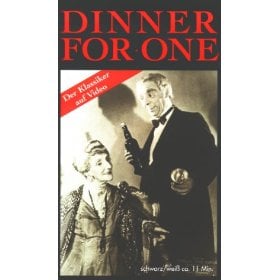Same Procedure as Every Year: The Story of “Dinner for One”

Memories are thick of this: the respectful, even reverential German introduction of a comedy sketch; the scratchy string orchestral music that adds a layering of anticipation. Black-and-white film. Dining room, white tablecloth, silver chandeliers. The names Freddy Frinton and May Warden. An English show broadcast on German public TV networks without subtitles. Family members, perched, sprawled, slumped, comfortable, lightly sozzled, eyes glued to an 18-minute sketch with only two actors: the attentive butler by the name of James, played by the roguish Frinton; the spinster lady of the birthday moment, Miss Sophie, played by Warden.
This 90th birthday is characterised by notable absences. After nine decades, mortality has done its bit of gathering. The venerable lady has been left the sole survivor of a circle of beloved friends. The bawdy subtext here is that they are all males and must have been a rather naughty crew at that. She misses them, and longs for their company.
The task for James seems, at least initially, innocuous. The table, with Miss Sophie at the head, is set for the spectral guests: Admiral von Schneider, Mr Pomeroy, Sir Toby and Mr Winterbottom. James assumes the role of each of the departed, standing before each empty seat for each course that will be served. “They are all here, Miss Sophie,” begins James. But his task is not merely to mimic them and assume their persona with conviction; he is also required to drink their share. The task is formidable, challenging both sobriety and liver. A different set of drinks must accompany the servings for the phantom guests: sherry with the mulligatawny soup; white wine with the fish; champagne with the bird; port with the fruit.
Through the course of the sketch, there are the tireless favourites for the audience. James trips over the head of a tiger skin rug with stubborn, unfailing regularity. Drinks are poured and drunk with gusto. Drinks are spilled. There is slurring. Before each course, the butler always inquires with increasing desperation: “The same procedure as last year, Miss Sophie?” The insistent reply follows: “The same procedure as every year, James.”
Dinner for One, or the 90th Birthday, was recorded in 1963 and found a ceremonial home across Germany’s regional public TV channels. Scribbled by Lauri Wylie in the 1920s, it had its London premier in 1948, making its way to Broadway in 1953. Frinton secured the rights in the 1950s. Both he and May had been performing it as a routine seaside resort gig, very much a music hall staple destined for modest obscurity. In 1963, German TV presenter Peter Frankenfeld, on a mission of cultural reconnaissance, was in one of those audiences in Blackpool. He fell in love. Frinton and May were invited to perform on his program Guten Abend before a live Hamburg audience at the Theater am Besenbinderhof, where it was recorded by NDR (Norddeutscher Rundfunk). In 1972, the ritual of showing the program as a New Year’s Eve special was established.
The date, Dinner for One retains the Guinness World Record for the most repeated program in history. It has created a commemorative industry in Germany. It spurs drinking competitions and inspires cookery. It has even inspired productions in various dialects: Hessian and Kölsch.
In 2017, more than 12 million Germans saw the show. But it remains unknown, for the most part, to audiences in the US and UK. Of the Anglophone states, Australia has had a decent, smattering acquaintance. Northern European states in Scandinavia and the Baltic are also familiar. It took till December 31, 2018 for the production to be shown in Britain.
Dinner for One has managed to emerge from its subcultural cocoon in music hall entertainment and heavy German consumption. Netflix took interest in it in 2016, if only to promote its own programs with a parody. The imaginary guests, on that occasion, were Saul Goodman (Michael Pan in Better Call Saul); Frank Underwood (Kevin Spacey in House of Cards), Pablo Escobar (Wagner Moura in Nacros) and Crazy Eyes (Uzo Aduba in Orange in the New Black).
As with all rituals, viewing Dinner for One comes with its presumptive historical and cultural baggage. For German audiences, this is a British museum piece with perennial relevance. There is more than a tang of hierarchy to it. Frinton and May converse in a setting of nostalgia and the whiff of a departed empire. Stefanie Bolzen, the UK and Ireland correspondent for Die Welt, was not wrong to wonder if the sketch had re-enforced such assumptions celebrated by the staunchest Brexiteers. The UK is leaving the European Union, but this little jewel of British slapstick remains the emotional preserve of German audiences, so much so it has become indigenous.
*
Note to readers: please click the share buttons above or below. Forward this article to your email lists. Crosspost on your blog site, internet forums. etc.
Dr. Binoy Kampmark was a Commonwealth Scholar at Selwyn College, Cambridge. He lectures at RMIT University, Melbourne. He is a frequent contributor to Global Research and Asia-Pacific Research. Email: [email protected]
Featured image is tagged under Fair Use

